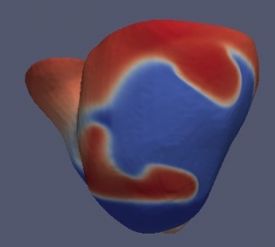Safety and efficacy of drug therapy in human heart
We applied a Systems Medicine approach to the investigation of drug-induced effects on the human heart using computational modelling and simulation combined with experimental and clinical investigation. Specifically, we are interested in investigating the following research questions:
- What are the key ionic properties determining inter-subject variability in the electrophysiological response to drugs in human non-diseased and diseased ventricles?
- What are the most promising anti-arrhythmic targets to increase both safety and efficacy of pharmacological treatment in human non-diseased and diseased ventricles?
- What are the major differences in the pro-arrhythmic and anti-arrhythmic mechanisms underlying human whole-ventricular electrophysiological response to drugs in non-diseased versus diseased conditions?
- Can we improve both selectivity and specificity of arrhythmic risk biomarkers based on novel findings from computational human ventricular models in non-diseased and diseased conditions?
- How much can we improve prediction of safety and efficacy of anti-arrhythmic therapy and reduce animal testing by using novel computational human models rather than animal experiments in industrial safety pharmacology?

We focus our investigations in 3 important disease conditions, which include acute myocardial ischaemia, atrial fibrillation and hypertrophic cardiomyopathy. In all cases, pharmacological therapy exhibits limited efficacy due to drug cardiotoxicity, which is a major concern for society, clinicians, regulators and industry. Drug-induced arrhythmias are more likely to occur in patients with a diseased heart, but drug safety screening is routinely conducted in healthy animal models. Therefore, little is known about how drug-induced ionic alterations modulate the human diseased pro-arrhythmic substrate to either decrease or increase arrhythmic risk.
Our Systems Medicine approach exploits synergies of combining computational, experimental and clinical research building on the expertise brought together by the Computational Cardiovascular Science team and collaborators. Mathematical models of human non-diseased and disease human atrial and ventricular models are constructed, based on the largest human ventricular experimental database available worldwide. Simulation studies are conducted to investigate how established and recently-proposed anti-arrhythmic targets alter the likelihood of initiation, establishment and spontaneous termination of arrhythmias in human nondiseased and diseased ventricles. In collaboration with pharmaceutical companies, we evaluate the predictive capacity of our computational models and biomarkers for drug safety and efficacy screening with respect to animal experiment-based methodologies.

